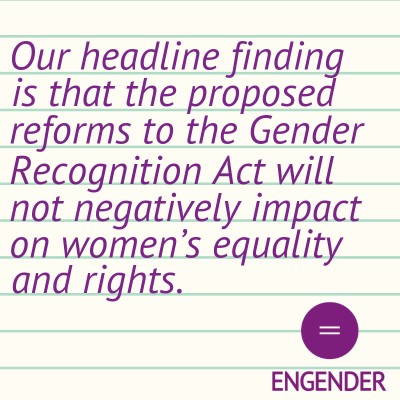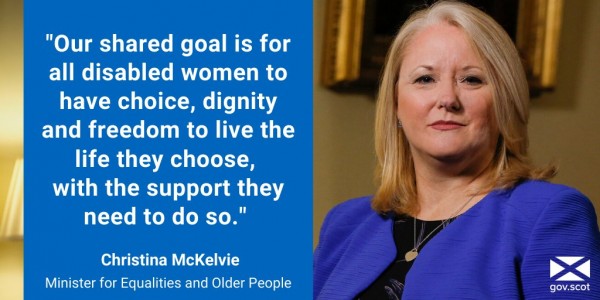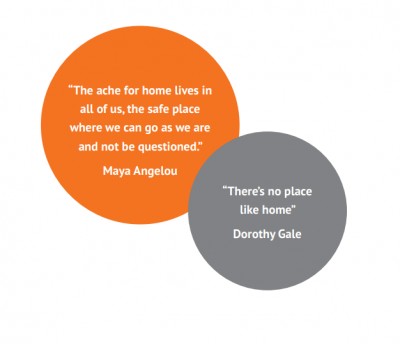Engender blog
All of Engender’s latest news. Reports, reviews, books, articles, and information from across Scotland’s women’s sector.
We would love to hear from other feminists around Scotland. Check out our guidelines for more information on how you can blog for us.
Engender's response to the Gender Recognition Act Reform Bill consultation

This week, Engender has responded to the Scottish Government’s consultation on the draft Gender Recognition Reform (Scotland) Bill. Although the actual consultation is very short, comprising just 5 questions focusing on technical details of the Bill, we took the opportunity to set out some of our broader thoughts about the Gender Recognition Act.
Our headline finding is that the proposed reforms to the Gender Recognition Act will not negatively impact on women’s equality and rights.
GUEST POST: Some thoughts on issues BAME women, including immigrants, face in the UK
Azita Jabbari-Arabzadeh is a BAME migrant women with an extensive background working with BAME women, including migrants and refugees. In this guest blog, Azita explores some of the issues which face migrant women in the UK, with a particular focus on health inequality.
I came across some shocking news regarding the health and the high rate of death of pregnant black women recently, which I believe, together with the news of a higher rate of mental health issues among South Asian women in the UK is at least worthy of some thoughts by the population and certainly worth sharing worth sharing with readers of the On the Engender blog.
Our Bodies Our Rights - speech from Christina McKelvie MSP
Today Engender was planning on hosting a Parliamentary reception to mark the anniversary of our report Our Bodies Our Rights: Identifying and removing barriers to disabled women's reproductive rights in Scotland. Given the developing situation around COVID 19 (also known as Coronavirus), and as the needs of disabled women and carers are at the heart of our work on Our Bodies Our Rights, we took the the difficult decision to cancel this event.
While we were incredibly disappointed not to be able to hold the event as planned, we're pleased to be able to share the speech which would have been given by Christina McKelvie, Minister for Equalities and Older People.

I am truly delighted to be here to hear and discuss the progress made since the launch of this incredibly enlightening and important report published just over a year ago.
We’re just past International Women's Day, a day to celebrate the social, economic, cultural and political achievements of women. The theme for this year is #EachforEqual, recognising the ways in which individual actions can challenge stereotypes and fight bias to collectively enable wider change as we build a more gender equal world. Seems apt!
Since the publication of Our Bodies, Our Rights, the Scottish Government has taken steps and made commitments which I hope you will be pleased to hear about tonight, and which I suspect some of your in this room were involved in making come about!
#MakingWorkVisible for International Women's Day 2020
Every International Women's Day, we ask women across Scotland to share their days with us, to highlight the unpaid, undervalued, and invisible work done by women in Scotland.
This includes the low-paid (and falsely-named 'unskilled') work which is dominated by women, the unpaid care work happening in houses across the country, household chores which are unevenly distributed (even if men think they are equally shared), and all of the mental labour which women are - say it with me now - "just naturally better at".
While the irony of asking women to live-tweet their days, thus adding to their to-do list, isn't lost on us, it's important to take the time to reflect on the gendered nature of what we see as 'work'. Not to call out partners who aren't pulling their weight (although that can be a pleasing side-effect), or to humblebrag about how much work we are doing, but because work which is vital to the wellbeing of all of us - volunteering, kinship care, marking celebrations, raising children - is still widely done by women.
This year, tweets highlighted the work that goes in to caring - the practical tasks and admin, the emotional cost of supporting a loved one, the additional strain which fears over coronavirus cause; the mental work which has to happen on a Sunday to make sure everyone goes to work or school with clean clothes, completed homework, and a packed lunch; the effort which goes into being social, into hosting friends, remembering birthdays, and keeping track of who's going where. Check out the #MakingWorkVisible hashtag to see more.
The invisible women in Scotland’s housing system

Housing and homelessness policy in Scotland is ignoring the specific experiences and needs of women according to a new report from Engender. Their research found that, despite both international human rights obligations and the Scottish Government’s own commitment to housing rights, half of the population is almost entirely absent from any briefings, research, and action plans.
The report highlights that while women in Scotland make up the majority of lone parents and carers, are far more likely to be living in poverty, and spend a far higher proportion of their income on accommodation than men, they are not represented in the discourse around housing. Homelessness, too, is repeatedly seen as a problem predominantly affecting men, despite the fact women’s homelessness simply looks different to men’s – rough-sleeping in less busy areas for safety, hiding their homelessness for fear of losing children, and (re)entering abusive housing situations.
Downloads
 Engender Briefing: Pension Credit Entitlement Changes
From 15 May 2019, new changes will be introduced which will require couples where one partner has reached state pension age and one has not (‘mixed age couples’) to claim universal credit (UC) instead of Pension Credit.
Engender Briefing: Pension Credit Entitlement Changes
From 15 May 2019, new changes will be introduced which will require couples where one partner has reached state pension age and one has not (‘mixed age couples’) to claim universal credit (UC) instead of Pension Credit.
 Engender Parliamentary Briefing: Condemnation of Misogyny, Racism, Harassment and Sexism
Engender welcomes this Scottish Parliament Debate on Condemnation of Misogyny, Racism, Harassment and Sexism and the opportunity to raise awareness of the ways in which women in Scotland’s inequality contributes to gender-based violence.
Engender Parliamentary Briefing: Condemnation of Misogyny, Racism, Harassment and Sexism
Engender welcomes this Scottish Parliament Debate on Condemnation of Misogyny, Racism, Harassment and Sexism and the opportunity to raise awareness of the ways in which women in Scotland’s inequality contributes to gender-based violence.
 Gender Matters in Social Security: Individual Payments of Universal Credit
A paper calling on the Scottish Government to automatically split payments of Universal Credit between couples, once this power is devolved to the Scottish Parliament.
Gender Matters in Social Security: Individual Payments of Universal Credit
A paper calling on the Scottish Government to automatically split payments of Universal Credit between couples, once this power is devolved to the Scottish Parliament.
 Gender Matters Manifesto: Twenty for 2016
This manifesto sets out measures that, with political will, can be taken over the next parliamentary term in pursuit of these goals.
Gender Matters Manifesto: Twenty for 2016
This manifesto sets out measures that, with political will, can be taken over the next parliamentary term in pursuit of these goals.
 Scottish NGO Briefing for UN Special Rapporteur on Violence Against Women
Joint briefing paper for the UN Rapporteur on Violence Against Women.
Scottish NGO Briefing for UN Special Rapporteur on Violence Against Women
Joint briefing paper for the UN Rapporteur on Violence Against Women.

Newsletter
Sign up to receive our newsletter here:
Sign up to our mailing list
Receive key feminist updates direct to your inbox: